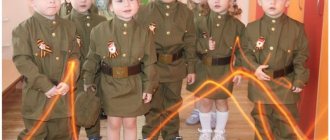MAGAZINE Preschooler.RF
Consultation for parents “Spiritual and moral education of preschool children”Spiritual and moral education in kindergarten is an integral part of the comprehensive education of a child, a necessary prerequisite for the revival of national culture; A qualitatively new stage of spiritual and moral education in kindergarten is the integration of its content into the everyday life of children, into all types of children's activities and traditional methods of preschool education.
Childhood is the time of development of all human powers, both mental and physical, the acquisition of knowledge about the world around us, the formation of moral skills and habits. In preschool age, there is an active accumulation of moral experience and turning to spiritual life. Systematic spiritual and moral education of a child from the first years of life ensures his adequate social development and harmonious personality formation.
Purpose of education:
- To lay the foundations of a spiritual and moral personality with an active life position, the ability for perfection and harmonious interaction with other people.
- To cultivate in children mercy, compassion, the ability to forgive insults, the desire to help those in need, to be tolerant and peaceful in relationships with everyone.
- Learn to be an example for others not in words, but in deeds, avoid evil, envy - be content with what you have, be able to ask for forgiveness, act honestly, never do to others what you do not want for yourself.
- Help maintain purity and chastity.
- To arouse interest in the study of Orthodoxy among educators and parents, thereby opening the way to spiritual improvement and knowledge of national culture.
Tasks:
- To foster patriotic feelings that connect different generations.
- Teach ethical behavior and self-discipline.
- Improve artistic taste, develop the creative potential of every child.
- To form artistic and speech skills, to replenish children’s vocabulary.
- To cultivate spiritual and moral feelings, revealing the meaning of Orthodoxy in a person’s life as an act of love, kindness, humanity, and unity.
- Orient the family toward the spiritual and moral education of children, familiarize parents with the basics of Orthodox pedagogy and psychology, and form ideas about the forms of family life.
Education of a spiritual personality is possible only through the joint efforts of the family, educational institution and the state. One of the problems of modern education is that the historical continuity of generations is not respected in the process of education. Children are deprived of the opportunity to follow the example of people who lived in the past; they do not know from the point of view of what truths past generations solved the problems that arose before them, which served as a beacon and source of creativity for them.
| Next > |
“Education of morality in children of middle preschool age” seminar-training with parents
Author - compiler:
Akhmerova Larisa Semenovna,
teacher
MBDOU "Kindergarten "Solnyshko"
Yamalo-Nenets Autonomous Okrug, Novy Urengoy
“Education of morality in children of middle preschool age”
Goal: increasing the level of knowledge of parents on the spiritual and moral education of children of middle preschool age;
Tasks:
- Ø improving work on the spiritual and moral education of preschool children;
- Ø expanding parents’ knowledge on the issue “Moral education of preschool children in the system of comprehensive personality development.”
- Ø development of psychological qualities that ensure personality-oriented communication between parents and children.
Seminar plan
- introduction
- “Spiritual and moral education of preschool children” (consultation with electronic presentation) – Akhmerova L.S.
- Business game – Akhmerova L.S.
- Summarizing.
Seminar progress:
- The Federal State Educational Standard for Preschool Education guides preschool workers to integrate teaching and upbringing into a holistic educational process based on spiritual, moral and sociocultural values and socially accepted rules and norms of behavior in the interests of the individual, family, and society. Times, eras, people change. But man’s desire for goodness, love, light, beauty, and truth remains eternal. Preserving humanity in our children, laying the moral foundations of life, teaching them the rules of communication and the ability to live among people - these are the main ideas for educating moral and patriotic feelings and spirituality. What we put into the child’s soul now will manifest itself later and become his and our life.
Exercise "Bowl"
— The soul of a child is a full cup. What kind of people do you want our children to be? What qualities would you like to give them? Each of you has a heart, write on the red side of it the quality that you want to give your child. Parents write qualities on the “hearts”. and place them in a “bowl” on an easel. - Look what a bright, beautiful soul we want to see in our children! The qualities written on the “hearts” are voiced. — Children always endow themselves with positive qualities when talking. You, too, as we see, want to endow your children with only good qualities. Then a contradiction arises: why do we often observe in our children the manifestation of such negativity as aggression, anger, greed, etc.? How can you explain this?
Discussion
Questions for parents: - Who do you think plays a primary role in the formation of universal human values in a child, such as kindness, justice, generosity, mercy, love, etc.? - What kind of adults should be like, among whom a child lives, so that this “cup” does not spill, does not break, but becomes even fuller? — Thank you for your statements and judgments. We, adults, have something to think about and change our attitude towards solving this problem.
2. “Spiritual and moral education of preschool children. Relevance." (consultation with electronic presentation)
The foundations of the moral education of preschool children are laid during the period when children learn to communicate with their peers, the types of their activities expand significantly, and their knowledge about the world around them is constantly replenished. If a three-year-old child does not yet feel guilty for an offense, then children 4-5 years old are already able to realize that they did something wrong. So how can parents determine the line when preschoolers are ready to learn moral standards and comply with them? There is a simple test: ask your child not to turn around while you unpack an interesting new toy behind his back, about which he should be notified. Did you survive? Didn't turn around? If a child has learned to control his desires and impulses, then he is quite ready to fulfill the requirements of the simplest moral standards.
Child and parents
Children learn their first ideas about good and bad at an early age from fairy tales told by their parents. The concepts of good and evil are formed in a playful, unobtrusive form. A huge role in the process of socialization belongs to moral education in the family, which is based on the relationships of its members. The child constantly hears that one must respect elders, share toys with a brother or sister, not hurt animals, and not deceive. But the most important example is the behavior of adults. A child who observes discourtesy, selfishness, and disrespect of parents for each other simply cannot behave differently. That is why moral education of preschool children is impossible outside the family.
Education of moral motives
One of the main tasks of moral education of preschoolers is to motivate children not only to know about the existence of certain norms, but also to want to comply with them. Of course, forcing is the easiest way. But you can act differently. Various methods of moral education of preschoolers come down to rewards and incentives. If you were honest, expect a reward; if you cheated, be prepared to be punished. For preschoolers, the approval of an adult, and especially a parent, is of great importance. The child tries to strengthen and maintain good relationships with his parents. This is exactly how the main motive arises, focused on the so-called social external control.
Good results are demonstrated by games for the moral education of preschoolers, which in a fun way convey to them the importance of observing moral standards.
The role of punishment
The peculiarities of the spiritual and moral education of preschool children do not allow us to do without punishments that should follow for non-compliance with moral standards. Harsh words and physical pain are methods that can cause irreparable trauma to a child’s psyche. The form and dosage of punishments are always individual, and the ability to use them is a special skill. The main thing is that the punishment does not touch the spiritual threads of trust that connect the child with his parents. Human dignity, even if the little man is only 3-4 years old, should never be humiliated!
Punishment is only external control. As the child grows up, the parents' control will weaken and eventually disappear altogether, so you cannot rely on an “external guardian.” The child must realize that this is necessary, first of all, for himself. Existing means of moral education of preschoolers make it possible to choose the optimal option for a particular child of motivation, reward and punishment.
The situation when the education of moral qualities in preschoolers is based on selflessness and creating a positive self-image in the child is an excellent reason to make the child feel his own importance. But such an image is inseparable from moral actions.
Business game “Spiritual and moral education of children through fairy tales.”
Once upon a time there were... every child hears these words with pleasure, warmth and hope for something new and interesting. Of course, the most popular genre for preschoolers is a fairy tale. She enters a child’s life early and not only entertains him, but also educates him aesthetically, morally, and develops him mentally. Moral concepts (honesty, kindness, philanthropy), vividly presented in the images of heroes, are reinforced in real life and relationships with loved ones, turning into moral standards that regulate the desires and actions of the child. The fairy tale, its composition, the vivid opposition of good and evil, fantastic and morally defined images, expressive language, the dynamics of events, special cause-and-effect relationships and phenomena that are understandable to a child - all this makes the fairy tale especially interesting and exciting for children. an indispensable tool for the formation of a morally healthy personality of a child.
A fairy tale is a source of folk wisdom. She teaches kindness, courage and honesty. Condemning evil and injustice, the fairy tale evokes in the child sympathy for the offended characters and thereby contributes to the formation of citizenship. A fairy tale can rightly be considered one of the important educational tools. The fairy tale hints that it is a loving heart, not a calculating mind, that helps you make the right choice. And it suggests that good always wins, and justice is more effective than brute force. The fairy tale teaches children to learn, to know themselves and the world around them.
Practical task. Look carefully at the illustrations. Teams need to create a fairy tale for children that would develop moral qualities in children. You also need to give a name to the fairy tale and come up with a moral.
Practical task.
7. Summing up.
You and I, adults, must be a good example for our children, give each child every day maximum attention, affection, trust and love, never humiliate the child’s dignity, do not ridicule his failures, do not criticize. Be able to find a fair solution to all problems. Always respond emotionally to your child’s problems, no matter how insignificant they may seem. Sincerely rejoice at the baby’s successes and achievements. Be able to see and celebrate the best qualities and achievements in a child. Praise the child often, but justifiably, act exclusively in the interests of the child, be able to look at what is happening through the eyes of the child, from his child’s individual position. Remember, a friendly smile from an adult, as well as a kind look, sympathy, support and the creation of a warm microclimate in the family, in the group - all this has a huge impact on the formation of the moral qualities of the child. Thank you for your attention!
Ten Keys to Successful Parenting
1. Take an informal approach to parenting. Pay attention to the quality of time spent with your child, not its quantity. Modern life has taught us all to unwittingly save on everything, including emotions, conversations, and communication with children. Therefore, instead of focusing all our attention on what the child is confusingly telling us, we listen absentmindedly, thinking about our own. Meanwhile, it has been scientifically proven that children of “stingy” and inept parents behave badly and feel lost. Therefore, even negative attention (disapproval, condemnation) is better than coldness and indifference. 2. Talk less, do more. Statistics say: we give our children up to 2000 (!) advice and comments a day. Therefore, it is not surprising that our children are becoming “deaf.” If a child, despite your requests, with enviable indifference throws socks turned inside out into the wash, wash them one day as they are. Let him see for himself that in this form it is impossible to wash and dry them. Actions are more convincing and louder than words. 3. Make children feel that they are strong in legal ways; otherwise they will find illegal ones themselves. And for this, children need to be consulted, given the right to choose, buy, count money, and prepare simple dishes. A two-year-old child can wash plastic dishes, fruit and put cutlery in a drawer. Of course, you will do it faster and better, but is that really the point? If you go without your children's help, you will deprive them of the opportunity to feel needed and strong. 4. Don't forget to think about what your words and actions can lead to. Ask yourself this: – What would have happened if I had not intervened? If we intervene when it is not necessary, we deprive children of the opportunity to see consequences and learn from their own mistakes. And thus we replace living life with grumbling moralizing and intimidation. If your child forgets to take breakfast with him, don’t put it in his briefcase every day. Let him forget it, get hungry and remember that in the morning he needs to put breakfast in his briefcase himself. 5. All your rules and requirements must be logically justified and understandable to the child. And for this, the next time he forgets to submit a film to the video library, do not rush to reprimand him - he will be offended, and the lesson will not be useful. Don’t run away yourself, don’t pay off his debts. Let him solve this problem himself and think about where to borrow money. The consequence for the child must be logically related to his own behavior. And only when he repays all his debt will the child see the logic in your discipline.
6. Avoid conflicts. If a child tests you with hysterics, resentment, anger, or speaks to you disrespectfully, it is better to leave and tell him that you are waiting for him in the next room to talk calmly. Do not give in to provocations and maintain equanimity as best you can. If you are offended or angry, you lose. 7. Don’t mix the guilt and the guilty together. A child can do something bad, but he cannot be bad. He must always be sure that he is loved no matter what he has done. If you doubt the correctness of your requirements, ask yourself honestly: “Will this make the child more confident in his abilities?” 8. You need to be able to be kind and firm at the same time. Let's say you told your daughter that she needs to get dressed in five minutes, otherwise you'll put her in the car in her nightgown. After the specified period has expired, you have every right to calmly and carefully take it to the car. And I dare to assure you: next time you will not have problems getting dressed in the morning. Only at this moment should you be kind and fair. 9. We must always remember about eternity and that our word will resonate not only now, but also in years to come, when our children will raise our grandchildren. Based on these considerations, sometimes we have to abandon simple and quick solutions to a problem, giving preference to complex and time-consuming ones, if this will bring great benefits to our children and grandchildren in the future. If we can hit a child, then, while trying to solve a momentary problem, we at the same time teach him aggressive actions in situations when we want to achieve something from another person or child. 10. Be consistent. If you have agreed that you will not buy candy in the store, keep your word, despite the whims, persuasion and tears, no matter how sorry you are for the child and no matter how much you want to back down. Your child will respect you more if he sees that you can keep your promises.
Literature used: 1. Order of the Ministry of Education and Science of the Russian Federation dated October 17, 2013 No. 000 of Moscow “On approval of the Federal State Educational Standard for Additional Education”. 2. Federal Law “On Education in the Russian Federation” of December 29, 2012 3. - author. “Parent meetings in kindergarten.” – M.: VAKO, 2014. – 240 p. 4. Shchetinina “Psychological and pedagogical concept of the development of a child’s socially adaptive individuality” Scientific and methodological journal “Kindergarten: theory and practice”. 2015. No. 2(50), pp. 77-78.
Internet resources:
https://girnyak-belosnegka.educrimea.ru/folders/post/delovaya_igra_melodiya_duhovno-nravstvennogo_vospitaniya
https://www.maam.ru/detskijsad/scenarii-seminara-duhovno-nravstvenoe-vospitanie-detei-doshkolnogo-vozrasta.html
https://pandia.ru/text/80/365/7236.php
https://www.maam.ru/detskijsad/roditelskoe-sobranie-na-temu-rol-semi-v-vospitani-duhovno-nravstvenoi-lichnosti-doshkolnika.html https://kladraz.ru/blogs/ekaterina-sergevna -martynova/seminar-dlja-roditelei-duhovnost-i-nravstvenost-nashih-detei.html
publication of the author on other Internet resources:
https://nsportal.ru/detskiy-sad/raznoe/2017/11/12/prakticheskiy-trening-s-roditelyami-na-temu-vospitanie-nravstvennosti
https://infourok.ru/prakticheskiy-trening-s-roditelyami-na-temu-vospitanie-nravstvennosti-u-doshkolnikov-srednego-doshkolnogo-vozrasta-2279261.html
“Certificate of publication in the media” Series A No. 0004672
We invite teachers of preschool education in the Tyumen region, Yamal-Nenets Autonomous Okrug and Khanty-Mansi Autonomous Okrug-Yugra to publish their teaching materials: - Pedagogical experience, original programs, teaching aids, presentations for classes, electronic games; — Personally developed notes and scenarios of educational activities, projects, master classes (including videos), forms of work with families and teachers.
Why is it profitable to publish with us?
1. “Kindergartens of the Tyumen Region” is an officially registered specialized media outlet at the federal level. 2. The activities of the editorial office are supported by the Department of Education and Science of the Tyumen Region 3. We issue a “Certificate of Publication” in the media. 4. The document has a unique number, is entered in the register, has the original seal of the editorial office of the online publication and signature. 5. “Certificate of publication” in the media is sent to the author in both paper and electronic versions.
Details >>>
Sample “Certificate of publication of author’s methodological material in the media.”pdf
Share
2992_Konsultatsiya dlya roditeley Dukhkhovno — nravstvennoe i patrioticheskoe vospitanie.docx
Consultation for parents on the topic “Spiritual, moral and patriotic education.” Educator of MADOO "CRR - d/s No. 2 of Shebekino, secondary correctional group Miroshnichenko V. A. Dear parents! One of the main tasks contained in the “Program of training and education in kindergarten” is spiritual, moral and patriotic education. Currently, the problem of spiritual, moral and patriotic education is very relevant. In the modern world, the situation has developed that young people have lost interest in culture and are not interested in their origins. Preschool age is the foundation of a child’s overall development, the starting period of all human beginnings. In raising a child, the example of an adult is of great importance, so it depends on us how strong this foundation will be. It is important to introduce a child to the culture of his people, because turning to the national heritage fosters respect and pride for the place where you live. In order to instill in a person a sense of pride in his homeland, from childhood he must be taught to love his city, the region where he was born and raised, the nature that surrounds him, introduce him to the cultural traditions of his people, instill a love for decorative and applied arts and folk art. Folk creativity and art are an eternal and pure source. Whatever our people show, it is immediately clear that from the depths of their souls, and the soul of the Kuban people is kind and beautiful. The Russian people should not lose their moral authority among other peoples, deserved by Russian literature and art. Therefore, native culture should become an integral part of the personality. Raising a spiritual and moral personality and a patriot of one’s Motherland is a responsible and complex task, the solution of which is just beginning in preschool childhood. Planned, systematic work, the use of a variety of educational means, the common efforts of us - the educators and you - the parents, the responsibility of adults for their words and actions can give positive results. - 643255- 12636500 Patriotic education in kindergarten Currently, one of the most pressing problems is the education of patriotism. Preschool educational institutions, being the initial link of the education system, are called upon to form in children a first understanding of the world around them, an attitude towards their native nature, their small Motherland, their Fatherland. Obviously, for this it is necessary to define moral guidelines that can evoke feelings of self-respect and unity. On July 11, 2005, the Government of the Russian Federation adopted the State Program “Patriotic Education of Citizens of the Russian Federation for 2005-2010.” The education system plays a leading role in the civic and patriotic formation of the younger generation. A child’s sense of homeland begins with love for the closest people - father, mother, grandmother, grandfather. And his home, the yard where he walked more than once, and the view from the windows of the apartments and kindergarten, where he gets the joy of communicating with his peers, and his native nature - all this is the Motherland. How many discoveries does a child make every day? And although many of his impressions are not yet realized by him, it all begins with admiration for what the little man sees in front of him. Very important for the education of patriotic feelings and historical knowledge. Knowledge of history is necessary for the formation of the civic position of a growing person, fostering love for the “small” Motherland and Fatherland, pride in the people whose works and talents Russia is famous for, a sense of belonging to the past, present and future of one’s people. What is the content of the problem? Preschoolers turned out to be the most ideologically unprotected. Due to age characteristics, their upbringing depends entirely on the adults around the child. According to educators, sociologists and doctors, it is precisely lack of spirituality that often leads to such a child being unprotected by the internal emotional intellectual barrier. The educational traditions of Ancient Rus' date back more than two thousand years. The historical elements of patriotism in the form of attachment to the native land, language, and traditions began to form in ancient times. Pedagogical thought in Rus' of the X-XIII centuries puts forward an individual personality as the goal of education, instilling faith in victory, in the invincibility of Russian heroes. Proverbs and sayings occupied an important place in the folk pedagogy of Russia. The core of all Russian education is patriotism. The concept of “patriotism” includes love for the Motherland, for the land where one was born and raised, pride in the historical achievements of the people. Drawing a parallel with our time, it is worth remembering that “love for one’s native land, native culture, native speech begins small - with love for one’s family, one’s home, one’s kindergarten. Gradually expanding, this love turns into love for the native country, for its history, past and present, for all humanity.” This is what Academician D.S. Likhachev wrote. To carry out this work with preschool children, the teacher must correctly use the sources of pedagogical skill, experience accumulated over centuries. Now let’s look at what “Ways and means of patriotic education of Russian people” include: 1. The concept of patriotism, heroism and their manifestations. 2. A look at patriotism in the chronicles. 3. Russian folk epics as a means of instilling patriotism (love of the Motherland, hatred of enemies, readiness to defend one’s native land). 4. The role of Russian fairy tales in the process of developing love for the Motherland, for one’s people, for the nature of one’s native land; tales about soldiers' friendship and so on. 5. Heroic and patriotic songs of the Russian people and their educational role 6. Russian proverbs and sayings about patriotism, heroism, courage, cowardice, betrayal. Their use in educational work with children. Russia is the homeland for many. But in order to consider yourself her son or daughter, you need to feel the spiritual life of your people and creatively assert yourself in it, accept the Russian language, history and culture of the country as your own. However, national pride should not degenerate into stupid conceit and complacency. A true patriot learns from the historical mistakes of his people, from the shortcomings of his character and culture. Nationalism leads to mutual hatred, isolation, and cultural stagnation. Spiritual, creative patriotism must be instilled from early childhood. But like any other feeling, patriotism is acquired independently and experienced individually. It is directly related to a person’s spirituality, its depth. Therefore, without being a patriot himself, a teacher will not be able to awaken in a child a feeling of love for the Motherland. It is to awaken, and not to impose, since the basis of patriotism is spiritual self-determination. “The Russian people should not lose their moral authority among other peoples - the authority deservedly won by Russian art and literature. We must not forget about our cultural past, about our monuments, literature, language, painting. . . National differences will remain in the 21st century if we are concerned with the education of the soul, and not just with the transfer of knowledge.” (D.S. Likhachev). That is why the native culture, like father and mother, should become an integral part of the child’s soul, the beginning that continues the personality. Based on the above, the following priorities have emerged: 1 The surrounding objects, which for the first time awaken the soul of a child, cultivating in him a sense of beauty and curiosity, must be national. This helps children from a very early age understand that they are part of the great Russian people. 2. We widely use all types of folklore (fairy tales, songs, proverbs, sayings, round dances, etc.). In oral folk art, the peculiarities of the Russian character, its inherent moral values, the idea of goodness, beauty, truth, courage, hard work, and loyalty have been preserved like nowhere else. By introducing children to sayings, riddles, proverbs, and fairy tales, we thereby introduce them to universal moral values. Russian folklore combines words, musical rhythm, and melodiousness in some special way. Nursery rhymes and jokes addressed to children sound like a gentle talk, expressing care, tenderness, and faith in a prosperous future. Proverbs and sayings aptly evaluate various life positions, ridicule shortcomings, and praise the positive qualities of people. A special place in works of oral folk art is occupied by a respectful attitude towards work and admiration for the skill of human hands. Thanks to this, folklore is a rich source of cognitive and moral development of children. 3. Folk holidays and traditions occupy a large place in introducing children to folk culture in the work of patriotic education. They focus on the most subtle observations accumulated over centuries on the characteristic features of the seasons, weather changes, and the behavior of birds, insects, and plants. Moreover, these observations are directly related to labor and various aspects of human social life in all their integrity and diversity. 4. Another important area of our work is to familiarize children with folk decorative painting. She, captivating the soul with harmony and rhythm, is able to captivate children with national fine arts. 5. Nature is one of the most important factors in folk teaching. She is not only a habitat, but also a native side, the Motherland. By introducing us to the nature of the region, we solve not only environmental problems, but also cultivate love for every object in nature. 6. Getting to know the historical past of Russia is a new, but very interesting direction in the work of instilling patriotism in children. Why do preschool children need knowledge about the history of the country? After all, a systematized history course is the task of the school. Yes, sure. But in order for children to learn this course well, it is necessary to form in them, even before school, initial reliable ideas about the history of our Motherland, and an interest in studying it in the future. In recent years, many pages of history have been rethought, so we are correct in the selection of educational material, taking into account the age-related characteristics of perception and the social preparedness of the child. The formation of patriotic feelings takes place effectively in close connection with the family. It is the parents who, through vivid, accessible examples of life, their work, and the attitude of the state towards children, demonstrate to the child that not only his family, but also the whole society, the whole country has hopes for him. For our part, we provide pedagogical support to the family in these matters through meetings, consultations and conversations, joint holidays and excursions. Parents can also be advised such forms of involving children in public life as walks and excursions and the purpose of getting to know historical places (close history), monuments to fallen soldiers; visiting a local history museum, art gallery, etc. What attractive force lies in what surrounds us in childhood? Why is it that even after leaving his native place for many years, a person remembers them with warmth, and when living in a city or village, he constantly proudly tells a guest about the beauty and wealth of his native land? I think this is an expression of deep affection and love for everything that has entered the heart as the most precious from an early age. Our love for our native places, the idea of what they are famous for, what nature is like, what kind of work people do - we pass all this on to children in our work, which is extremely important for the education of moral and patriotic feelings. What we can be proud of is our history. I want to awaken in children a sense of pride in the Russian people, who gave the world great commanders and thinkers, liberators of the world from fascism and space pioneers. Our children have something to be proud of; they should not grow up as Ivans who do not remember their kinship.





